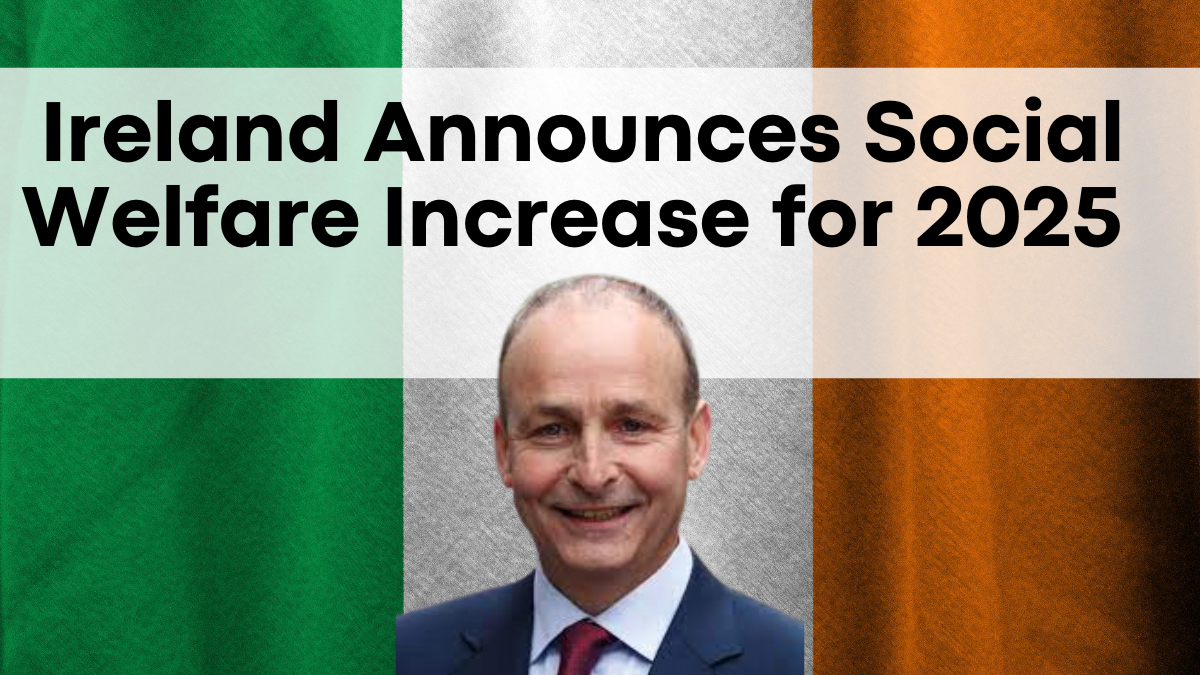The Irish government’s Budget 2025 has triggered a major change in social welfare payments. Effective from March 1, 2025, the maximum weekly social welfare payments increased by €12. This change also applies proportionately to people on reduced rates, meaning nearly everyone receiving state support will benefit. With the rising cost of living, this increase is seen as a critical step to help ease financial pressure for individuals and families.
This reform is part of the largest social welfare budget in Ireland’s history. Social Protection Minister Heather Humphreys emphasized that over 1.4 million people are set to benefit. The increase also includes additional support for qualified adult dependents and higher payments for children, demonstrating a broader commitment to supporting low- and middle-income households.

Ireland Announces Social Welfare Increase for 2025
| Topic | Details |
|---|---|
| Article Heading | Social Welfare Increase 2025 |
| Country | Ireland |
| Announced By | Social Protection Minister Heather Humphreys |
| Department | Department of Social Protection |
| Effective From | March 1, 2025 |
| Main Increase | €12 per week for standard payments |
| Child Payment Increase | €4 per child |
| Find Full Details | Visit Official Source |
Main Changes in Social Welfare Payments
General Weekly Payment Increases
From March 1st, the core weekly social welfare payments rose by €12. This applies across a wide range of supports including Jobseeker’s Allowance, Disability Allowance, and other long-term payments. Those receiving reduced payments due to part-time work or other reasons are also seeing proportional increases.
The government has also ensured that people who rely on social protection as their primary source of income—such as older adults, people with disabilities, and unemployed individuals—are not left behind. This adjustment aims to prevent erosion in the value of welfare payments caused by inflation and higher household expenses.
Child Benefit Adjustments
Child-related payments saw a targeted rise to address the rising costs of raising a family. The weekly payment for a qualified child increased by €4. For children under 12, the new rate is €46 per week. For children aged 12 and above, the rate has gone up to €54. This reflects the government’s recognition that older children typically come with higher associated costs, such as education and transport.
These increases are expected to help families struggling with school-related expenses, food costs, and other day-to-day needs.
Additional Social Welfare Adjustments
Domiciliary Care Allowance
Families with children who have severe disabilities will receive a €10 monthly increase in the Domiciliary Care Allowance. A key change here is that this payment now extends to 18-year-olds still in full-time education. Previously, payments stopped on a child’s 18th birthday, regardless of their school status. This shift offers continued support during the critical transition to adulthood.
State Pension Reform
In a move to provide more flexibility for older workers, individuals can now choose to delay retirement past age 66 and continue working up to age 70. Each additional year of work will increase the state pension by 5%, allowing people to boost their pension entitlements. This new phased retirement model helps address concerns for those who may not have enough contributions to qualify for a full pension at 66.
Caregivers are also acknowledged in this reform. Many who stepped away from the workforce to care for family members will now find it easier to qualify for pension benefits under updated contribution rules.
Working Family Payment Threshold
To keep pace with the rising minimum wage—which increased to €12.70 per hour—the income threshold for the Working Family Payment was raised by €54 per week. This ensures that low-income working families won’t lose out on benefits simply because of wage growth. It’s a buffer to protect net income and avoid benefit traps.
Student Grant Boost
Students are also gaining from this budget. Over 50,000 students will receive an increase of more than €300 in their annual maintenance grants. The change kicks in with the 2025 academic year and is expected to ease financial stress on families and young people. Additional support for postgraduate students is also part of the reform, with significant increases for many.
Energy Credit
To help households manage utility bills, a second €150 energy credit will appear in accounts starting March 1, 2025. This is particularly aimed at supporting households during the tail end of the colder months, when energy usage remains high.
Employment Programme Increases
Participants in government-funded employment schemes—such as Community Employment (CE), Tús, the Rural Social Scheme, and the Work Placement Experience Program—will receive a €12 increase in their weekly payments. These programmes are vital for community development and long-term employability, and the raise reflects a commitment to making participation more financially sustainable.
FAQs
Who is eligible for the €12 increase?
All individuals receiving full-rate social welfare payments qualify. Those on reduced or part-time rates will receive proportionate increases.
What if I have dependent children?
You’ll receive an additional €4 per week for each qualified child. The amount depends on their age, with older children receiving a higher rate.
When do these changes take effect?
All payment increases began on March 1, 2025.
Will pensioners benefit from this?
Yes. Pensioners can delay retirement and boost their payments by 5% for each extra working year beyond age 66. Caregivers also benefit from revised eligibility rules.
What support is there for families and students?
Increased child payments, higher thresholds for the Working Family Payment, and boosted student grants are all part of the new package.
Click here to learn more